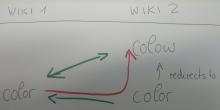As an editor I want to have as many Wiktionary pages connected to each other across language versions as possible in order to make accessing them easy.
Problem:
Right now Cognate discards redirects and doesn't show interwiki links to redirect pages. This task is for the first part of fixing this issue. After this at least one direction of the linking should work. It is illustrated in red in the following sketch:
BDD
GIVEN Wiktionary 1 with a page titled "color"
AND Wiktionary 2 with two pages titled "color" and "colour"
AND the page "color" redirecting to "colour" on Wiktionary 2
WHEN viewing the interwiki links in Wiktionary 1
THEN a interwiki links to the page for "color" on Wiktionary 2 is shown in the sidebar
Acceptance criteria:
- interwiki links to redirect pages are accepted by Cognate and shown in the sidebar
Notes:
- We have an intentional check in the code to prevent this case. This task is about removing the check.
- People say they'd likely not want the second step so we will for now only do this step of the two steps.

